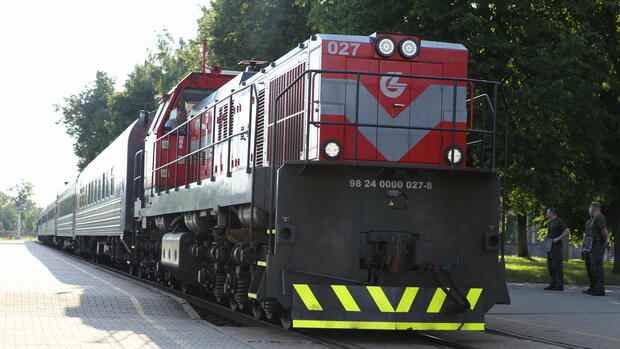Riga, Brussels Russia is again allowed to transport sanctioned goods through Lithuania to its Kaliningrad exclave. This emerges from a document published by the European Commission on Wednesday afternoon. This is intended to defuse the dispute over the transit of goods between the Russian heartland and Kaliningrad.
Tensions had recently increased. In Berlin and Brussels, concerns grew about an uncontrolled escalation. The background is the decision of the Lithuanian government to restrict the movement of goods through their country. Moscow then threatened “practical retaliatory measures”.
The so-called Guidance of the EU Commission now makes it clear that Russia may deliver sanctioned goods such as cement, steel or alcohol to its Baltic Sea region by rail, provided that the quantities do not noticeably exceed the average of the past three years. No sanctioned goods should be allowed to be transported by road. In addition, no goods that can be used for military purposes may be transported by rail. Lithuania may monitor compliance with these rules and, if necessary, stop the transports.
SPD faction leader Rolf Mützenich was relieved that the conflict should be defused. “I welcome the Commission’s recommendation,” he told Handelsblatt. “A trade dispute over Kaliningrad would be playing with fire.” The EU must avoid “fomenting new conflicts” and instead “find a de-escalation dynamic.” Mützenich emphasized: “Our sanctions did not intend to restrict transit traffic between two Russian regions.”
Top jobs of the day
Find the best jobs now and
be notified by email.
The Kaliningrad region is part of Russia but lies between Poland and Lithuania on the Baltic Sea. There is no direct land connection to the rest of the state. Thus, Lithuania’s decision in mid-June to restrict the transit of sanctioned goods en route to the exclave had sparked protests and threats from Moscow.
The Lithuanian government referred to the provisions of the fourth EU sanctions package and argued that it should only implement what had been jointly decided at EU level. The government also emphasized that it had coordinated its approach with the Commission.
Negotiations dragged on
Moscow, on the other hand, described the restrictions as “illegal” and referred to the 1994 partnership agreement between the EU and Russia. In order to settle the dispute and prevent a possible escalation, the EU Commission originally wanted clarification before July 10th publish, as Lithuania had extended the restrictions to other product groups on this date. But the negotiations took longer than expected.
Diplomatically, the European Union’s decision was a balancing act. The aim was to prevent possible aggression by Russia on the one hand and not to publicly snub Lithuania as an EU and NATO member state on the other.
>> Read here: “After Ukraine we would be next”: Lithuania’s fears of an escalation of the war
The content of the document is now in the interest of the federal government. Germany in particular had pushed for the new guidelines. Chancellor Olaf Scholz had personally spoken out in favor of exempting the movement of goods to Kaliningrad from the sanctions.
The EU Commission does not want the transit dispute with Moscow to escalate.
(Photo: AP)
Many countries in Eastern Europe, on the other hand, are likely to view the agreement with concern. Ahead of the decision, an Eastern European diplomat said it was wrong to back down now. “Putin is only impressed by strength,” he declared. In the Baltic States and in Eastern Europe, there are fears that Europe could become susceptible to blackmail from Russia through pressure on individual member states. “If we show weakness, he will immediately come up with the next demand,” said the diplomat. Under no circumstances should the EU give the impression that it is allowing Russia to put individual member states under pressure.
Lithuanian Prime Minister Ingrida Simonyte has not yet commented on the agreement. However, she said the EU Commission will publish new guidelines later this week, adding that the Guidelines are not a joint agreement between Lithuania and the Commission.
Lithuania’s Foreign Ministry welcomed the commission’s guidance in a statement on Wednesday evening, saying the country will not ignore “the positions and assessments” of its partners. At the same time, the ministry admitted that the new guidelines “could give the unjustified impression that the transatlantic community is softening its position and sanctions policy towards Russia”.
“We are aware that one of the goals of the Kremlin regime is to divide our transatlantic entity, create distrust and sow discord among allies,” the statement said. However, Lithuania will “remain loyal to the transatlantic partnership and continue to adhere to a uniform and coordinated EU sanctions policy”.
More: No vodka for Kaliningrad? Tensions between the EU and Russia are increasing
